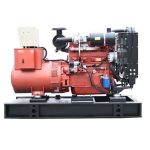Introduction
In times of natural disasters and emergencies, one of the most critical needs is access to power. Electricity is essential for communication, medical services, food storage, and various other vital functions. When the main power grid is down due to a disaster such as a hurricane, earthquake, or flood, diesel generators play a crucial role in providing temporary power solutions. In this article, we will explore the importance of diesel generators for disaster relief efforts, their key features, benefits, challenges, and best practices for their deployment in emergency situations.
Importance of Diesel Generators in Disaster Relief
Diesel generators are reliable sources of power that can be quickly deployed to provide electricity in areas affected by disasters. These generators are designed to operate for extended periods of time, making them ideal for powering emergency response centers, hospitals, shelters, and other critical facilities. In disaster situations where the main power supply is disrupted, diesel generators can bridge the gap and ensure that essential services continue to function.
One of the primary advantages of diesel generators is their portability and ease of use. These generators come in various sizes, ranging from small portable units to large industrial-grade systems, allowing them to be deployed in a wide range of scenarios. Diesel fuel is also readily available and has a long shelf life, making it a practical choice for emergency power generation.
sources tell me of Diesel Generators for Disaster Relief
1. Durability: Diesel generators are built to withstand harsh conditions and heavy usage, making them well-suited for disaster relief operations where continuous power is essential.
2. Fuel Efficiency: Diesel engines are known for their fuel efficiency, allowing generators to run for extended periods without the need for frequent refueling.
3. Power Output: Diesel generators are capable of producing high levels of power, making them suitable for running large appliances, equipment, and facilities.
4. Low Maintenance: Diesel generators require minimal maintenance compared to other types of power generation equipment, reducing downtime and ensuring reliable performance during emergencies.
Benefits of Diesel Generators in Disaster Relief
1. Rapid Deployment: Diesel generators can be quickly transported to disaster-affected areas and set up to provide immediate power, helping to restore essential services and support relief efforts.
2. Reliability: Diesel generators have a proven track record of reliability and performance, making them a trusted source of power during emergencies when other forms of electricity may be unavailable.
3. Versatility: Diesel generators come in various sizes and configurations, allowing them to be used in a wide range of applications, from powering small medical facilities to large-scale disaster response centers.
4. Longevity: Diesel generators are built to last and can operate for extended periods without compromising performance, ensuring a stable source of power throughout the duration of a disaster relief operation.
Challenges of Using Diesel Generators in Disaster Relief
While diesel generators offer numerous benefits for disaster relief efforts, there are also challenges associated with their use. Some of the key challenges include:
1. Fuel Availability: In some disaster scenarios, access to diesel fuel may be limited or compromised, making it challenging to keep generators running continuously.
2. Environmental Impact: Diesel generators produce emissions that can contribute to air pollution and climate change, raising concerns about their environmental impact, especially in prolonged disaster relief operations.
3. Noise Pollution: Diesel generators can be noisy, which may be a concern in crowded emergency shelters or medical facilities where a quiet environment is essential for patient care and recovery.
4. Maintenance Requirements: While diesel generators are generally low maintenance, they still require regular servicing and upkeep to ensure optimal performance, which can be challenging in remote disaster-affected areas.
Best Practices for Deploying Diesel Generators in Disaster Relief
To maximize the effectiveness of diesel generators in disaster relief operations, it is essential to follow best practices for their deployment. Some key best practices include:
1. Conducting Needs Assessment: Before deploying diesel generators, assess the power requirements of the affected area to determine the appropriate size and number of generators needed to meet the demand.

2. Ensuring Fuel Supply: Establish a reliable source of diesel fuel and develop a plan for refueling generators to prevent interruptions in power supply during relief operations.
3. Monitoring Emissions: Implement measures to monitor and mitigate the environmental impact of diesel generators, such as using low-emission models and ensuring proper ventilation in generator installations.
4. Training and Maintenance: Provide training to personnel on how to operate and maintain diesel generators to ensure safe and efficient operation throughout the disaster relief operation.
5. Integration with Renewable Energy: Where possible, integrate diesel generators with renewable energy sources such as solar or wind power to reduce reliance on fossil fuels and minimize environmental impact.
Conclusion
Diesel generators play a critical role in disaster relief efforts by providing essential power when it is needed most. These reliable and versatile sources of electricity can be quickly deployed to support emergency response operations, medical facilities, shelters, and other vital services in disaster-affected areas. While diesel generators offer numerous benefits for disaster relief, there are also challenges that need to be addressed, such as fuel availability, environmental impact, and maintenance requirements. By following best practices for their deployment, including conducting needs assessments, ensuring fuel supply, monitoring emissions, and providing training and maintenance, diesel generators can be effectively utilized to enhance disaster response and recovery efforts.
